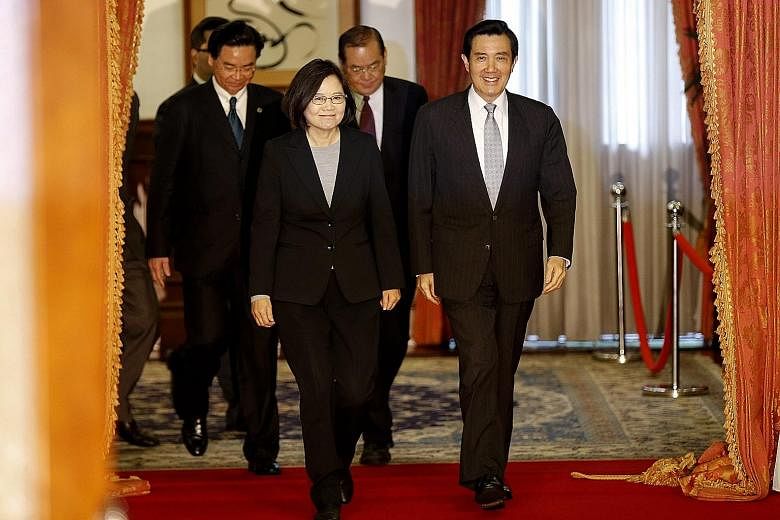With Taiwan faced with challenges including uncertain cross-strait ties and an economy struggling to restructure, its current and incoming presidents have pledged to set aside differences to ensure a smooth transfer of power.
Yesterday's meeting between Mr Ma Ying-jeou of the Kuomintang and Ms Tsai Ing-wen of the Democratic Progressive Party (DPP) was their first since Ms Tsai and her party swept to victory in the Jan 16 elections.
Her inauguration is set for May 20, a full four months after she was elected. The long transition period means that many major policies have had to be put on hold, with some languishing in the now DPP- controlled legislature.
This is but the latest footnote in the island's bitterly polarised politics.
The leaders both struck a conciliatory note, calling for cooperation and stability as power is transferred from a party known to be Beijing- friendly to one that has called for Taiwan's independence from the mainland.
"During the heat of the hustings, we had our differences and political considerations. But the public now expects us to sit down and rationally discuss societal issues no matter what happened in the past," said Ms Tsai, who will be Taiwan's first woman president.
The leaders made brief opening remarks before holding their closed-door meeting, which lasted 70 minutes, to discuss the transition and sticky issues such as Taiwan's diplomatic relations with allies, many of which are reportedly looking to switch their allegiance to China.
A smiling Mr Ma greeted Ms Tsai, saying: "Long time no see."
She responded wryly: "I see you on television."
"As do I," he replied.
In his remarks, Mr Ma said: "Taiwan today is facing many challenges, both external and internal. The two parties need to cooperate with sincerity, in order to effect a breakthrough."
As for Ms Tsai, she called for the institutionalisation of a mechanism that ensures smooth transition of power in future.
This is important, said analyst Chen I-hsin of Tamkang University, given Taiwan's status as a youthful democracy.
This handover marks the third transfer of power since Taiwan introduced direct presidential elections in 1996. During the second transition - from the DPP's Mr Chen Shui-bian to Mr Ma in 2008, the former stymied the process by destroying working documents.
-
Warning over proposed law
-
BEIJING • The Chinese government yesterday warned Taiwan that the passage of a proposed new law governing relations between the two could seriously damage the basis for cross-strait talks, and that Beijing opposed any obstacles to developing ties.
China has looked on with suspicion at Taiwan since Ms Tsai Ing-wen and her pro-independence Democratic Progressive Party (DPP) won the presidential and parliamentary elections in January on the back of a wave of anti-China sentiment.
In 2014, hundreds of students occupied Taiwan's Parliament for weeks in protests dubbed the Sunflower Movement, demanding more transparency amid fears over China's growing economic and political influence on the democratic island.
The protests over the 2013 Cross-Strait Service Trade Agreement, which aimed to open up investment from both sides in industries such as banking, healthcare and tourism, were the largest display of anti-China sentiment in Taiwan in years.
The DPP is proposing that the island's Parliament should first pass a so-called cross-Taiwan Strait supervision law before it will consider agreeing to the trade pact. China is worried that the law would stymie future agreements with Taiwan.
Asked about the law, a spokesman for China's Taiwan Affairs Office said the basis for talks between the two sides should not be damaged.
"Anything that damages the basis for consultations and negotiations between the two sides of the strait, interferes in or impedes relevant progress or puts up man-made blocks on the development of ties, we will resolutely oppose," spokesman An Fengshan said at a regular briefing.
The trade deal has stalled in Taiwan's Parliament, although the manner in which the self-ruled island moves forward in the February-to-May session will be seen as a sign of how Ms Tsai will steer Taiwan-China ties.
REUTERS
Said Dr Chen: "I don't think such a thing will happen this time."
While both leaders did not refer directly to the elephant in the room - a seemingly hawkish Beijing looking to pressure Ms Tsai into recognising the one-China principle - it nevertheless loomed large over some of the discussions.
One issue was Taiwan's diplomatic ties. Two weeks ago, Gambia established formal ties with China, marking an end to an eight-year unspoken truce between Taiwan and China not to poach each other's diplomatic allies. There are now concerns that Taiwan's remaining 22 allies may follow suit.
Yesterday, Ms Tsai recognised her predecessor's diplomacy work, and promised to continue in the same vein if she could, said Presidential Office secretary-general Tseng Yung-chuan at a post-meeting briefing. At the same time, she added that Taiwan's diplomatic predicament is one faced by the whole of Taiwan and "not a partisan problem".
In Beijing, its Taiwan Affairs Office spokesman An Fengshan warned that cross-strait ties would suffer if Ms Tsai did not recognise the 1992 Consensus, which states that there is one China but that both sides are free to interpret what that means.


